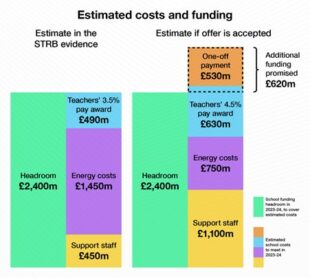Teacher strikes latest: Everything you need to know about the teacher pay offer

Teachers in England have been offered a pay rise after the government made an offer to education unions on salaries, working conditions and workload.
The offer follows more than a week of intensive discussions between the Government and the National Education Union (NEU), National Association of Head Teachers (NAHT), Association of School and College Leaders (ASCL) and NASUWT.
Here we tell you everything you need to know about our teacher salary offer, from funding to what it means for strikes, along with plans to manage the workload.
What is the government salary offer for teachers?
Our offer includes salary increases for teachers for this academic year and next year.
Teachers receive a one-off payment of £1,000 for the current school year.
This is on top of the average 5.4% salary increase teachers received in September 2022. Teachers and executives were offered an average salary increase of 4.5% from 2023 to 2024. This is above the Office for Budget Responsibility (OBR) forecast. Inflation at the end of this calendar year, which stands at 2.9% and is expected to fall further.
Starting salaries for new teachers will increase by 7.1% to £30,000, meeting the government’s pledge.
All four unions will now present this deal to their members.
Does the offer include anything about the working conditions of the teachers?
As part of the offer, we have proposed reforms to teachers’ workloads and conditions.
Schools will be able to make their own decisions about salary developments and end performance-related pay.
Schools are getting more clarity on the timing of Ofsted inspections.
A new task force will be set up to reduce the workload of teachers and managers by an average of five hours a week.
How is the government’s salary offer for teachers funded?
Schools will receive additional funds for wage premiums.
The one-off payment of £1,000 for teachers will be funded by the Government through a new grant to schools.
Schools will receive an additional £2 billion in 2023-2024 and 2024-2025, taking school funding to its highest level in history.
With energy costs forecast to fall faster than previously expected, an average salary increase of 4% for schools is now considered affordable.
The Institute for Fiscal Studies (IFS) has also published an assessment of school funding and costs, which comes to similar conclusions.
Costs beyond this affordable 4% are also covered by the new funding.
Does this mean that schools will have to make cuts if the salary offer is accepted?
Based on school budgets for 2022-2024, after accounting for teacher pay increases, schools still have £2.4 billion to fund in 2022:
- an increase in teacher salaries from 2023 to 2024;
- a salary increase for auxiliary staff from 2023 to 2024;
- the increase in energy costs for schools in 2023-2024.
The government will give schools around £620m in further funding in 2023-2024, including a £530m one-off payment grant.
By combining the available headroom with the additional funds promised in recent talks, schools should be able to give teachers an average salary increase of 4.5% without having to cut anything else.

How do teachers vote on the salary offer?
Unions will now make the offer to their members in the coming weeks.
This is a fair and reasonable offer, and we encourage teachers and leaders to accept it.
If the offer of higher pay is declined, next year’s pay will go through the independent salary review process as usual.
This will be disappointing for those teachers who want an extra £1,000 this year and are guaranteed a 4.5% pay rise next year.
Will there be more teachers’ strikes?
No further teachers’ strike dates have been confirmed at this time, but the NEU has threatened two more strike dates.
It is deeply irresponsible for children’s education to be disrupted because of trade disputes.
As exam times for the GCSE and A-level exams approach, students and their parents shouldn’t have to worry about possible strike disruptions.
Accepting this offer on pay, conditions and workload would prevent further disruption.